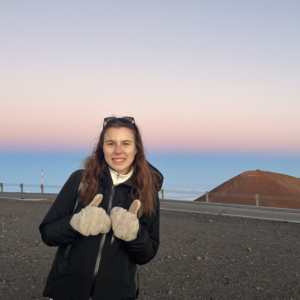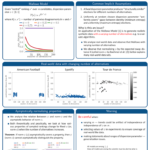Conference Reports: International Conference in Machine Learning (ICML) 2023
Sonja Kraiczy (University of Oxford, https://sonja.uk)
I attended ICML 2023, held from July 23rd to July 29th, 2023, at the Hawaii Convention Center on Oahu, the Hawaiian Island. My main reason for attending was to present a
paper accepted at the main conference. The paper, titled "Properties of the Mallows Model Depending on the Number of Alternatives: A Warning for an Experimentalist," is a
collaborative effort with Piotr Faliszewski and Nicolas Boehmer. This collaboration began during a research visit that Niclas and I made to Professor Piotr Faliszewski in Krakow in August 2022 and is still ongoing.
On the research I presented
The part of our work that I presented focused on analyzing a widely used random model for ranked data. We explored this model both theoretically and in its applicability to real-world scenarios where the number of ranked items can vary. This model, characterized by a fixed parameter, is often used in the literature to generate realistic data for evaluating algorithmic properties, among other things. We compared the fixed parameter approach with similar methods as the number of items increased and explored the concept of rescaling the parameter based on the number of items. The two models yielded different theoretical predictions for various properties of the data. This allowed us to examine real-world datasets with varying item counts and compare their statistics to the predictions of each model. Our findings led us to caution against relying solely on the fixed parameter assumption and recommend using the scaled model for simulations by default.
paper
Properties of the Mallows Model Depending on the Number of Alternatives
poster
Perks of a large conference with a broad audience
I presented our work in the form of a poster during the afternoon session on the third day of the main conference. What made this experience particularly valuable was the diverse audience at ICML. Our research falls into one of the many specialized areas represented at the conference, which resulted in a wide range of interdisciplinary interactions. Not only did machine learning researchers visit my poster, but I also got to talk to a neuroscience student and people from the tech or finance industry, which helped give a broader perspective on the research; People with different backgrounds are not accustomed to common approaches in our area and may offer a fresh and unbiased perspective. This was in stark contrast to our presentation of the same paper at the non-archival workshop COMSOC 2023, where the audience was more narrowly focused. In my opinion, nurturing both types of interactions is essential for academic growth.
Talks and research that inspire
ICML was the first conference I ever attended, and I had the privilege of attending for the second time this year. What struck me most was is palpable sense of excitement (and worry) that permeates the conference. It always feels like a beacon for research that is leading us straight into the future. The impact of ICML was particularly evident through its invited speakers in fields such as genetics, climate science, and social impact. These speakers provided valuable insights and inspired us to align our research with their respective domains.I was particularly excited to attend a talk by Nobel Prize laureate Jennifer Doudna. She received the Nobel Prize in Chemistry in 2020 for her work on the development of the CRISPR-Cas9 gene-editing technology, jointly with Emmanuelle Charpentier. CRISPR-Cas9 is a groundbreaking gene-editing tool that has revolutionized genetic research and biotechnology. Jennifer Doudna discussed how machine learning research could collaborate with genetics to advance our understanding of genetics and potentially cure genetic diseases, following the successful example of Sickle Cell disease. Similarly, Shakir Mohamed from Google DeepMind addressed the challenges in climate science and how Machine Learning can enhance our understanding and prediction of climate phenomena. These experiences have inspired me to explore the role of machine learning and large language models in the fields of algorithmic game theory and algorithmic social choice in future research. Obtaining elaborate data on people’s preferences can be infeasible due to cognitive constraints and unfortunately, the quality of the decision suffers if it relies on lower quality data. Large language models could potentially serve as intermediaries to extract and predict preferences from interactions, overcoming possibly the major limitation of our research area.
Opportunities and social activities
The conference’s setting in Hawaii added a unique dimension to the experience. Attendees used the ICML app to organize activities such as snorkeling and hiking in the mornings before the conference. After the conference, various meet-ups brought together individuals with shared interests, whether for activities, research discussions, or networking within specific institutions or companies. Additionally, some attendees had the opportunity to attend complimentary dinners hosted by prominent companies, providing a chance to engage in discussions with industry experts and fellow attendees. I had great fun at both the Google Research and Jane Street dinners. My visit ended with trying surfing for the first time with PhD students from all over the globe. I thank AISB for their financial support, which helped make my visit to ICML possible.

About the Author
Sonja Kraiczy is a PhD Student at Oxford University University supervised by Professor Edith Elkind. Her research lies in the area of algorithmic social choice and algorithmic game theory. Previously, she read for an MSc in Mathematics and Foundations of Computer Science at Oxford University she completed her undergraduate degree in Mathematics and Computer Science at the University of Glasgow.

